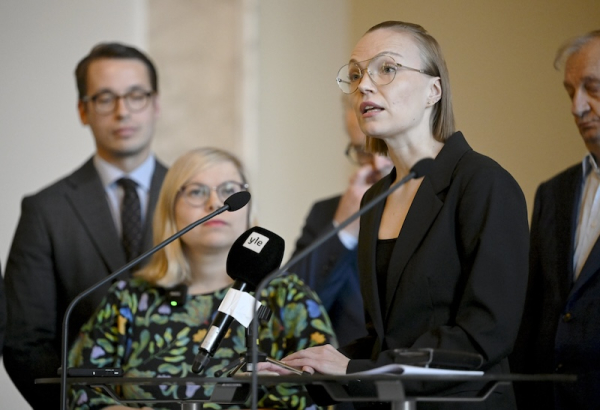Finland’s parties agree on debt brake, Left Alliance opts out

Member of Parliament Minja Koskela (Left Alliance) spoke at a parliamentary group press conference in the Parliament House’s State Hall on 14 October 2025. The event focused on a cross-party agreement on the management of public finances. Photo: Antti Aimo-Koivisto / Lehtikuva
- Next Article Stubb and Orpo to meet Trump in Washington to discuss Ukraine, trade and icebreaker deal
Finnish parliamentary parties have reached a cross-party agreement on a “debt brake” aimed at reducing public borrowing in the coming years. The pact, finalised on Tuesday, binds parties to shared fiscal targets across election cycles. The Left Alliance was the only parliamentary group to reject the deal.
The agreement establishes a framework under which parties will jointly set medium-term fiscal goals before each parliamentary election. These goals will determine the acceptable level of deficit for the state, municipalities and wellbeing regions by the end of each parliamentary term.
The pact includes a deficit ceiling of 2.5 percent of gross domestic product and an initial debt-to-GDP target of 60 percent, in line with EU requirements. Once achieved, a national goal of 40 percent will follow. Finland’s public debt currently stands at about 88 percent of GDP.
Jukka Kopra of the National Coalition Party called the decision “a historic day” and said the agreement marks “the return of reason to Finland’s economic policy”. He added that the joint approach gives long-term direction and transparency to fiscal planning.
The new mechanism resembles the Swedish model, in which parties agree on fiscal adjustments together while maintaining freedom over how to achieve them. Tytti Tuppurainen of the Social Democratic Party said the debt brake would not dictate specific policies but would make political alternatives clearer for voters.
“It will no longer be about who cuts the most,” Tuppurainen said. “Parties must now explain what kind of structural reforms or savings they will use to reach shared targets.”
The agreement, negotiated under Jani Mäkelä of the Finns Party, establishes a permanent parliamentary working group to monitor compliance. The largest governing party will chair the group, while the largest opposition party will serve as vice-chair. The group will review targets mid-term and adjust them if necessary.
Markus Lohi of the Centre Party said the deal builds “a bridge to a sustainable economic path”. He noted that stricter national targets, such as the 40 percent debt goal, will not take effect until the 2030s.
“This does not restrict political action, but it does force us to build a sustainable economy,” Lohi said.
The Green League decided to support the pact after negotiations softened what it described as an overly rigid framework. Saara Hyrkkö, the party’s deputy parliamentary leader, said the result was “more of a seatbelt than a brake” for economic policy. “The model is not perfect, but it is better with us than without us,” she said.
The Left Alliance, led by Minja Koskela, refused to join the agreement. Koskela said the party agrees that Finland’s growing debt is a concern but views the mechanism as unnecessary and potentially harmful.
“The debt brake is either redundant or needlessly damaging,” Koskela said. She argued that EU fiscal rules are already strict enough and warned that the national system could limit flexibility during economic downturns.
Koskela also expressed concern that the new parliamentary working group will gain significant political influence over fiscal policy. “It becomes an extra structure above existing committees, concentrating power in a way that benefits the right,” she said.
Other parties, including the Christian Democrats, the Swedish People’s Party, and Liike Nyt, joined the consensus. Peter Östman of the Christian Democrats said the deal would “reduce populism” by imposing clearer fiscal discipline, while Harry Harkimo of Liike Nyt called it “a necessary response to Finland’s economic situation”.
The agreement aims to bring Finland’s debt under control over the next decade, with mid-term reviews and safeguards for exceptional circumstances such as war or national crises.
HT
- Next Article Stubb and Orpo to meet Trump in Washington to discuss Ukraine, trade and icebreaker deal
Source: www.helsinkitimes.fi
